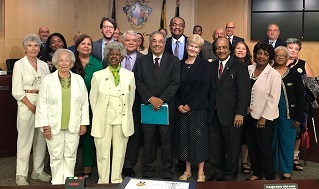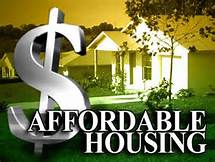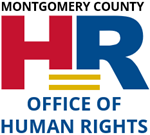Fair Housing
Overview
As a part of the Office of Human Rights, the Fair Housing Program has developed a far-reaching program of outreach and monitoring activities.
Educational activities include training for landlords, real estate professionals, property managers, lenders, and other housing professionals, as well as information to and training for the general public. A 10th grade fair housing curriculum has been developed and incorporated into all 10th grade social studies classrooms in each of the 23 Montgomery County high schools. Each fall, a fair housing Poster Contest is conducted in at the Human Rights Diversity Camp from students. The winning entry is displayed on Ride On bus routes county wide during Fair Housing Month in April.
The Office of Human Rights has developed a comprehensive program of testing for discrimination in the rental or sale of housing, home mortgage financing and compliance with architectural guidelines. Enforcement actions are taken as warranted by the Office of Human Rights' Compliance Section.
As part of determining the level of discrimination in the County, the Office of Human Rights periodically conducts studies or surveys. This may include, for example, an evaluation of the practices of rental housing providers in the County, and the frequency and patterns of any possible discriminatory behavior.
If you feel you have been a victim of housing discrimination and would like to file a complaint, visit the Compliance Section of this web site, or call 240-777-8450 or TTY 240-777-8480. To obtain information on fair housing or to arrange for training for your business, group, or organization, call 240-777-8450. Informational brochures and video are also available below.
Fair Housing Webinar (IAOHRA/HUD)
View the International Association of Official Human Rights Agencies (IAOHRA)/ U.S. Housing and Urban Development (HUD) Challenges of Housing Access in a Racially Divided Nation During COVID-19 webinar, held on Thursday, August 13, 2020. Participants heard from HUD FHEO Assistant Secretary Anna María Farías, as well as national fair housing experts. Discussions included: Unique Fair Housing Issues Presented by COVID-19; Best Agency Practices in the Age of Pandemic; and Fair Housing and COVID-19 as seen through Race and Gender Equity Lenses.
Interagency Fair Housing Coordinating Group
The Montgomery County Interagency Fair Housing Coordinating Group was established by Chapter 27, Section, 27-26H of the Montgomery County Code. The purpose of the coordinating group is to facilitate and promote the County's efforts to prevent discrimination in housing.
The coordinating group consists of one or more employees of each of the following agencies:
- Office of Human Rights
- Housing Opportunities Commission
- Department of Economic Development
- Department of Housing and Community Affairs
- Department of Health and Human Services
- Community Engagement Cluster
In addition, the Executive may designate one or more members of the Executive's staff, and employees of any other County department or office, to serve on the coordinating group. The Executive must also invite the County Council, the Montgomery County public schools, and the Maryland-National Capital Park and Planning Commission to designate one or more staff members to serve as full members of the group.
In order to create a public forum and encourage diverse participation, the Executive must invite representatives of the housing industry and active community groups to participate in meetings.
For additional information, call the Office of Human Rights at 240/777-8450 or by TTY at 240/777-8480
See the Office of Human Rights calendar for meeting dates.
Publications and Articles
Fair Housing Publication
Discrimination in the Rental Housing Market Against People Who Are Deaf and People Who Use Wheelchairs: National Study Findings Publication. This report provides results of the first national paired-testing study of housing discrimination against people who are deaf or hard of hearing and against people who use wheelchairs. This report was published by the U.S. Department of Housing and Urban Development and the U.S. Office of Policy Development and Research.
Open Housing Law
Council President Hans Riemer presented a proclamation recognizing the 50th anniversary of Montgomery County passing the Open Housing Law, which prohibits discriminatory practices against people seeking to buy or rent homes. The presentation honored the hard work in the face of adversity of the community leaders and organizations present, and the challenges that remain in ensuring equal access to housing for all. The Council was joined by representatives of the Human Rights Commission, the Office of Human Rights, the NAACP, the Interagency Fair Housing Coordinating Group, the Housing Opportunities Commission, and the community of fair housing advocates. Back row, pictured left to right: Esther Delaplaine, Patrice Cheatham, Myrian Torrico, Alejandro Becerra, James Stowe, Vernon Ricks, Loretta Garcia, Pat Fenn; front row, left to right: Jackie Simon, Tina Clarke, Judge William England, Louise Kauffmann, Dr. Suresh K. Gupta, Janice Freeman, Cuvator Armstong. Watch the proclamation.

Affordable Housing
Why Affordable Housing in a Black Neighborhood May Not Help Black Residents, Washington Post Article, August 2016. SAN FRANCISCO. The Willie B. Kennedy Apartments are exactly what the neighbors have been wanting: new affordable housing in a market with little of it, homes for seniors in a city flush with young tech, real investment in a historically black part of town that has long been losing its black population. But residents of San Francisco's Western Addition neighborhood won't be prioritized when the wait list opens today for the 98 studios and one-bedroom apartments for low-income seniors here. Last year San Francisco passed a law that would reserve 40 percent of units in new affordable housing projects for people from the communities surrounding them. It gave hope to residents of this rapidly changing neighborhood that they'd have the first chance to live in the new building, financed in part with federal money.

Independent Foreclosure Review Payment Agreement
$9.3 Billion in Payments and Foreclosure Assistance to Begin in April 2013. On March 18, 2013, more than 4.2 million people were sent postcard notices about payments they will receive as a result of an agreement between federal banking regulators and 13 mortgage servicers. As a result of this agreement, the Independent Foreclosure Review ceased at those servicers. A full list of companies and their affiliates or subsidiaries covered by the agreement are listed below. The agreement provides $3.6 billion in cash payments to borrowers covered by the agreement. Borrowers covered by the agreement include those whose primary residences were in any stage of the foreclosure process in 2009 or 2010 and whose mortgages were serviced by one of the participating servicers. Payments are expected to range from a few hundred dollars to $125,000. By accepting the payment, borrowers do not waive any legal claims against their servicer and may pursue additional actions related to their foreclosure.

